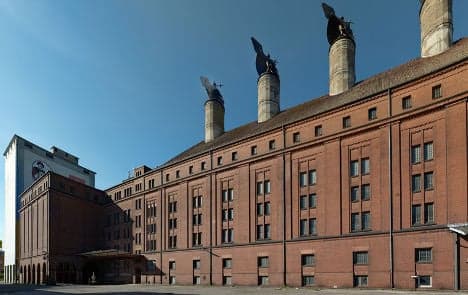Berlin project promises urban fish and veg 'Fresh from the Roof'

Ambitious plans are being drawn up in Berlin for what will be the world's biggest roof-farm, growing vegetables on top and breeding fish in tanks inside, in a self-watering and fertilising system.
Managers of Berlin’s Malzfabrik, a former factory in the south of the city, are developing the plans to fit in with the cultural and social projects as well as office and art space already established in the complex.
The old brewery, built in 1917 by Schultheiss Brewery, stopped making beer in 1996, and was turned into a multipurpose complex full of everything from artists to photographers in 2008. It still has 22 boilers which had been used for malt, but which will be turned into big fish tanks for tilapia.
The factory's roofs, a total of 7,000 square metres – about the size of a football field – will be glassed over and then covered in lettuce, kohlrabi, tomatoes and herbs. The project will be called “Fresh from the Roof”.
The idea is to sell the vegetables in the Malzfabrik as well as local shops – but the garden on the roof will be intimately linked to the fish.
“The kicker is that our system is self-contained,” said Nicholas Leschke, deputy manager of the Malzfabrik.
“Only the fish food will be brought in.” The water system will be a closed one, with the water from the fish, enriched with their excrement being used to water and fertilise the plants, which in turn clean the water which is fed back to the fish. This will mean that the production of a kilo of fish will only need 200 litres of fish rather than the 1,000 litres generally needed.
“All the rest of the resources we will need will come from renewable energy and rainwater collection,” said Karoline von Böckel, head of sustainability for the project.
The Malzfabrik project leaders have already tested the aquaponic system of water circulation on site, and successfully grew tomatoes this summer in a green house on top of an old shipping container in which the fish were housed.
This is now set to be expanded, and work is ongoing in cooperation with the city’s Technical University to produce a feasibility study. “This will show us how the farm can be economically established in detail,” said Leschke.
The next challenge will be to secure investors to put in the €5 million needed to set the whole thing up. Leschke is confident it will work.
“No-one will be able to stop us with our project. There are enough sponsorship programmes for people like us in the vanguard,” he said.
The aim is to have the growing – and swimming – in full swing by the spring of 2013.
DAPD/The Local/hc
Comments
See Also
Managers of Berlin’s Malzfabrik, a former factory in the south of the city, are developing the plans to fit in with the cultural and social projects as well as office and art space already established in the complex.
The old brewery, built in 1917 by Schultheiss Brewery, stopped making beer in 1996, and was turned into a multipurpose complex full of everything from artists to photographers in 2008. It still has 22 boilers which had been used for malt, but which will be turned into big fish tanks for tilapia.
The factory's roofs, a total of 7,000 square metres – about the size of a football field – will be glassed over and then covered in lettuce, kohlrabi, tomatoes and herbs. The project will be called “Fresh from the Roof”.
The idea is to sell the vegetables in the Malzfabrik as well as local shops – but the garden on the roof will be intimately linked to the fish.
“The kicker is that our system is self-contained,” said Nicholas Leschke, deputy manager of the Malzfabrik.
“Only the fish food will be brought in.” The water system will be a closed one, with the water from the fish, enriched with their excrement being used to water and fertilise the plants, which in turn clean the water which is fed back to the fish. This will mean that the production of a kilo of fish will only need 200 litres of fish rather than the 1,000 litres generally needed.
“All the rest of the resources we will need will come from renewable energy and rainwater collection,” said Karoline von Böckel, head of sustainability for the project.
The Malzfabrik project leaders have already tested the aquaponic system of water circulation on site, and successfully grew tomatoes this summer in a green house on top of an old shipping container in which the fish were housed.
This is now set to be expanded, and work is ongoing in cooperation with the city’s Technical University to produce a feasibility study. “This will show us how the farm can be economically established in detail,” said Leschke.
The next challenge will be to secure investors to put in the €5 million needed to set the whole thing up. Leschke is confident it will work.
“No-one will be able to stop us with our project. There are enough sponsorship programmes for people like us in the vanguard,” he said.
The aim is to have the growing – and swimming – in full swing by the spring of 2013.
DAPD/The Local/hc
Join the conversation in our comments section below. Share your own views and experience and if you have a question or suggestion for our journalists then email us at [email protected].
Please keep comments civil, constructive and on topic – and make sure to read our terms of use before getting involved.
Please log in here to leave a comment.